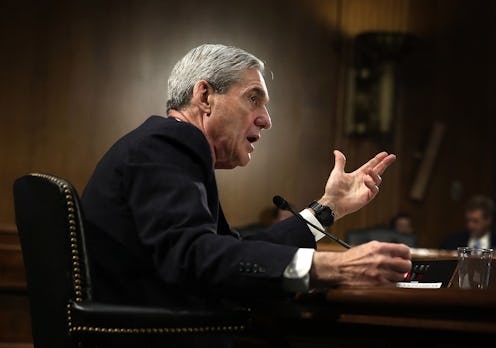News
The Special Counsel Is Still At Trump's Mercy

One of the thorniest questions that comes up in American government is how to approach foul play in the executive branch. The president is given extraordinary autonomy by the Constitution. President Nixon's infamous defense that "when the president does it, that means that it is not illegal" is shocking to hear, but legally speaking, close to true. Still, Nixon resigned; the president, after all, is not a law unto himself. And the legal way to investigate executive branch misconduct is by appointing a special counsel. Today, the only entity who can do so is the Justice Department, which is exactly how Robert Mueller landed his role as special prosecutor.
The comparisons between today's investigation into the Trump administration and the Nixon Watergate scandal are ubiquitous. This is not entirely justified, as the two cases are meaningfully different in several ways. (There's a huge distinction between covering up spying on one's political opposition and being possibly beholden to a hostile foreign power, for starters.)
But examining the Nixon era does illuminate some of today's circumstances. Robert Mueller's 1970s counterpart was a special prosecutor named Archibald Cox. Like Mueller, Cox was appointed by the Justice Department. But as the Justice Department falls under executive authority, Nixon could demand and ensure that Cox be fired — which is exactly what he did.
And while it would be politically damaging, there is nothing to stop Trump from doing the same to Mueller. As Erwin Chemerinsky and Eric M. Freedman argue today in the Los Angeles Times, the current setup is not sufficient to ensure a proper investigation, one that allows for prosecutorial authority but is simultaneously free from the threat of removal.
In fact, it was after Nixon fired Cox that Congress took action on this problem by passing the Ethics in Government Act. Its primary purpose was to allow Congress to appoint its own "independent investigator," someone who would operate outside the executive branch, and would therefore be immune to threats of removal.
During the tenure of President Reagan, the Democratic-controlled Congress appointed independent counsel Lawrence Walsh to investigate the Iran-Contra affair. His findings eventually led to 14 people being charged in the "guns for hostages" scandal.
And under President Clinton, Republicans appointed independent counsel Kenneth Starr to investigate Whitewater. His digging eventually turned up Monica Lewinsky, which led to impeachment proceedings after Clinton was perceived to have lied under oath about his relationship with Lewinsky.
Perhaps because both parties got burned by granting Congress authority to appoint an independent prosecutor, the House and Senate let the Ethics in Government Act expire in 1999.
And that means that in the world of today, only the DOJ can effect a special counsel. Since Attorney General Jeff Sessions has had to recuse himself from any investigation into Russia's ties with the administration, Mueller was appointed by Deputy Attorney General Rod Rosenstein. Hopefully, he won't meet the same fate as Archibald Cox.